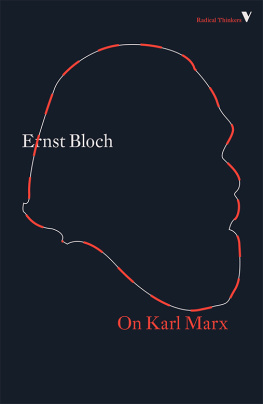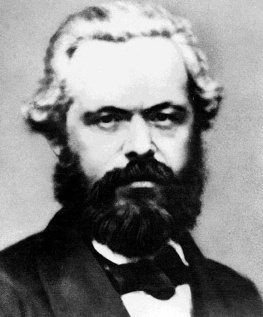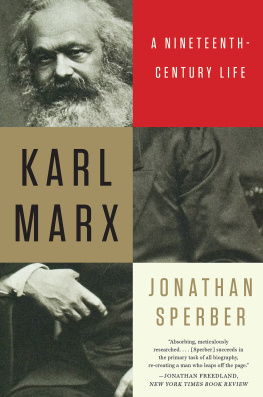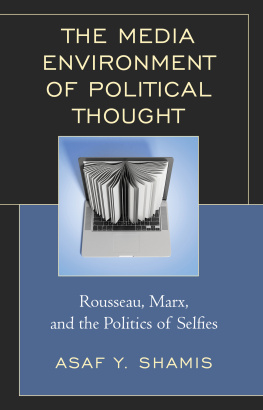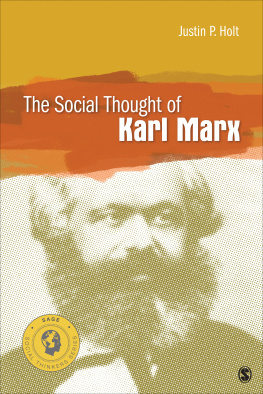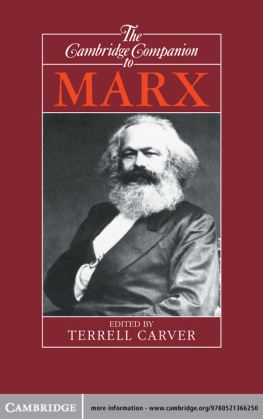ON KARL MARX
ERNST BLOCH

This English-language edition published by Verso 2018
First published in English by Herder and Herder, Inc. 1971
Originally published by Suhrkamp Verlag as ber Karl Marx 1968
from Das Prinzip Hoffnung, 3 vols. (passim) 1959
Ernst Bloch 1959, 1968, 1971, 2018
Translation John Maxwell 1971, 2018
All rights reserved
The moral rights of the author have been asserted
1 3 5 7 9 10 8 6 4 2
Verso
UK: 6 Meard Street, London W1F 0EG
US: 20 Jay Street, Suite 1010, Brooklyn, NY 11201
versobooks.com
Verso is the imprint of New Left Books
ISBN-13: 978-1-78663-606-5
ISBN-13: 978-1-78663-608-9 (UK EBK)
ISBN-13: 978-1-78663-607-2 (US EBK)
British Library Cataloguing in Publication Data
A catalogue record for this book is available from the British Library
Library of Congress Cataloging-in-Publication Data
A catalog record for this book is available from the Library of Congress
Printed and bound by CPI Group (UK) Ltd, Croydon, CR0 Y44
CONTENTS
Karl Marx and Humanity:
The Material of Hope
Changing the World:
Marxs Theses on Feuerbach
ON KARL MARX
True growth is always open and youthful, and youth implies growth. Youth, like growth, is restless; growth, like youth, would lay the future open in the present. Apathy is their common enemy, and they are allies in the fight for that which has never been but is now coming into its own. Now is its day; and its day is as young and as vital as those who proclaim it and keep faith with it.
If we look back to the very dawn of our daytime, we look back to the young Marx in his first years of intellectual ferment. What we can learn of one who was surely the most passionately alert of all students is encouraging, and a challenge to us, the heirs of his maturity. We still have a letter of November 1837 that the nineteen-year-old Karl wrote to his fatherwho lived in the same town as Jenny von Westphalen, his sons future wife. But this letter addressed to Dearest Father does not merely throw light on the relations between Dr. Heinrich Marx and his famous son: its fresh and creative spirit makes it a living document for every young student. Of course, this is a vivacity characteristic of the letters of great writers in their youth (one thinks of Goethe in Leipzig and Strasbourg, of Byron, of Georg Bchner). But here one can sense the ardor of the great thinker to come. Even though Jenny gives occasion for a more lyrical note, this is a letter without equal as a record of a young philosophers tempestuous and far-ranging mind.
The young mans every experience is heightened: The rocks could not be sharper than my sensibility and art itself could not match Jennys beauty. Everything he sees is rich with significance, yet everything is ready to change and make room for something new in the wind. Every metamorphosis, writes this student whose maturity would be so meaningful for the worlds future, is partly a swan song and partly the overture to a great new poem which, in a medley of blurred though brilliant colors, is still struggling to emerge as form. Marx responds to a world in the process of development; to a summons and to a melody; to that which comes into being and then must pass away. Yet he checks any tendency to dream vaguely of the future; all the anticipation of a Marx-inbecoming moves him to engage in an insatiable though exacting tussle with the scholars: with law and philosophy. This is Marx as a young Faustnot Goethes, but the flesh-and-blood Faust proper to the age. Three and a half years were to pass before he submitted his doctoral dissertation, and the Marx of this letter is neither the pure idealist of his poems nor a skeptic. His approach is already essentially logical and scientific, and, rather than follow the Mephistophelean counsel to despise reason and knowledge, he is filled with enthusiasm for these doors of entry to the world. The shape the future will take, its actuality, is being established in the ferment of the present; out of subjectivity and abstraction must emerge the face of concrete realitythe thing that really matters. The only obstructions are the mists of false consciousness and abstract thought, both of which Marx rejectstogether with Hegel, and against him: In the concrete expression of a living world of ideas, such as law, the State, Nature, and philosophy as a whole, the object itself must be observed as it develops. There must be no arbitrary categorizations: the rationale of the thing itself must proceed in its own course of internal contradiction and so attain to its own intrinsic unity. Mind is still the agent, but the perception of the later Marx is already apparent in the inversionthe standing on its feetof the ratio of the thing.
Obviously the writer of this letter is not wrapped up in himself. Though his quest for knowledge is no uniform, untroubled process, but one which has known blind alleys and moments of obscurity, it is always undertaken anew, moves ever onwards. Marx describes the quantity of writing he has done: poems, a vast opus on the philosophy of law, a dialogue, notes, notes, notes; manuscripts which ended in anguish or self-reproach; and his voracious reading and expeditions across and straight through the globus intellectualis; yet all related with the eagerness of an explorer in virgin lands. This optimism contrasts remarkably with the merely imitative intellectual spirit predominant in post-Hegelian Berlina twilight feeling, as if somehow nothing really impressive could be produced after Hegel, by whom the world had been thoroughly schematized; as if the world spirit had arrived philosophically in Hegels teaching, and all that was left for young philosophers was to transplant it from its initial Berlin residence to the left, or subjective and critical, side of self-consciousness. The stirrings of the 1848 revolution were not felt in this environment, and were not produced by an idealism which the left Hegelians had endowed with a spurious rigor and clarity. The opposed wretchedness of the period before the March Revolution of 1848 was only increased by an apathy which was unopposable on an idealistic basisan intellectual decadence which continued to affect the entire prescriptive philosophy of the nineteenth century, apart from Marxism.
The most obviously unique characteristic of the young Marx was his objective and youthful vigor amid the surrounding post-Hegelian decay. The young philosopher was concerned essentially neither with himself nor with the insipid flatlands about him; instead he reflected the light of a world that had not yet come to be but on whose horizon he stood. The letter of 1837 and the doctoral dissertation of 1841 are wholly free of the lethargy of idealism; and more than a knowledge of Feuerbach enabled their author to see the era not as one of mellow decay but as a turning pointa material turning point, with Marx as the discoverer of the new. Hence the wholly public self-consciousness of the young Marx: a self-awareness concerned with the actuality of the future as the future of actuality. His genius accorded with the revolutionary mandate of the age; the subjective and objective suasions to shape the future were allied. Rosenkranz, a contemporary Hegelian, offered a formulation in his Psychology (1843) that found its living exponent in Marx: The characteristic quality of genius is not, like that of talent, a formal versatility (even though it can enjoy that too), but a realization of what is objectively necessary in a certain sphere as its individual destiny. Accordingly, a man of genius is properly exercised only in the development of

